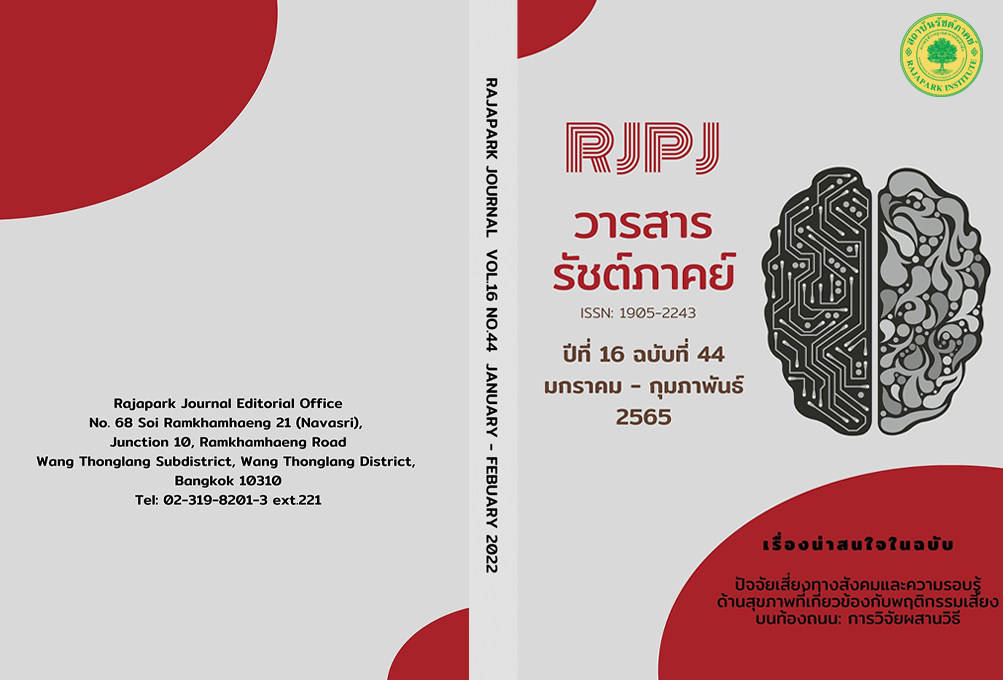Job Satisfaction as the Mediator Linked between Organizational Culture and Self-Efficacy to Job Performance in the Case of a Petrochemical Industry in Map Ta Phut Industrial Estate, Rayong Province
Main Article Content
Abstract
The objectives of this research were to study 1) the level of organizational culture, self-awareness, job satisfaction, and job performance 2) job satisfaction as the mediator linked between the organizational culture and job performance, and 3) job satisfaction as the mediator linked between the self-awareness and job performance. This research is quantitative research, the samples used in the research were 100 employees of the petrochemical industry in Map Ta Phut Industrial Estate, Rayong province. The research instrument was a questionnaire. The descriptive statistics used in research are the frequency, percentage, mean, standard deviation, and structural equation model (SEM). The results revealed that 1) the organizational culture, self-awareness, job satisfaction, and job performance were at a high level in all factors with average values of 4.13, 4.23, 3.91, and 4.27 respectively and the standard deviation values were 0.892, 0.692, 0.977 and 0.680 respectively, 2) the factors organizational culture, self-awareness, and job satisfaction have directly influencing job performance were 0.001, 0.288, and 0.584 respectively, organizational culture and self-awareness indirectly influenced job performance were 0.191 and 0.054, and 3) organizational culture and self-awareness have directly influencing job satisfaction were 0.664 and 0.186. The results of this research show that self-awareness has a greater effect on job performance than organizational culture and job satisfaction.
Article Details

This work is licensed under a Creative Commons Attribution-NonCommercial-NoDerivatives 4.0 International License.
Views and opinions appearing in the Journal it is the responsibility of the author of the article, and does not constitute the view and responsibility of the editorial team.
References
Asiedu, E. (2015). Supportive Organizational Culture and Employee Job Satisfaction: A Critical Source of Competitive Advantage. A Case Study in a Selected Banking Company in Oxford, a city in the United Kingdom. International Journal of Economics & Management Sciences, 4(7), 1-8.
Bandura, A. (1994). Self-Efficacy. Retrieved May 16, 2021, from https://www.uky.edu/~eushe2/Bandura/Bandura1994EHB.pdf
Habib, S., Aslam, S., Hussain, A., Yasmeen, S., & Ibrahim, M. (2014). The Impact of Organizational Culture on Job Satisfaction, Employees Commitment, and Turnover Intention. Advances in Economics and Business, 2(6), 215-222.
Judge, T. A., Jackson, C. L., Shaw, J. C., Scott, B. A., & Rich, B. L. (2007). Self-Efficacy and Work-Related Performance: The Integral Role of Individual Differences. Journal of Applied Psychology, 92(1), 107-127.
Leingchan, R. (2019). Industry Outlook 2019-2021: Petrochemicals. Retrieved May 16, 2021, from https://www.krungsri.com/th/research/industry/industry-outlook/Petrochemicals /Petrochemicals/IO/io-petrochemicals-19
Likert, R. A. (1932). Technique for the Measurement of Attitude. Archives Psychological, 3(1), 42-48.
Lunenburg, F. C. (2011). Understanding Organizational Culture: A Key Leadership Asset. National Forum of Educational Administration and Supervision Journal, 29(4), 1-12.
Murad, M. M. I., Zayed, N. M., & Mukul, A. Z. A. (2013). A Study on Job Satisfaction: Focus on Bankers of Bangladesh. European Journal of Business and Management, 5(17), 14-20.
Munisamy, S. (2013). Identifying Factors that Influences Job Performance Amongst Employees in Oil Palm Plantation. Faculty of Applied Social Sciences, Open University Malaysia.
Periyakul, M. (2010). Partial Least Square Path Modeling. Bangkok: Ramkhamhaeng University.
Salman, M., Khan, M. N., Draz, U., Iqbal, M. J., & Aslam, K. (2016). Impact of Self-Efficacy on Employee’s Job Performance in Health Sector of Pakistan. American Journal of Business and Society, 1(3), 136-142.
Saremi, H., & Rezeghi, A. A. (2015). A Study on the Relationship between Self-Efficacy Beliefs and Organizational Commitment with Job Satisfaction in Office Employees in Esfarayen City, Iran. International Journal of Life Sciences, 9(6), 15-23.
Shaju, M., & Subhashini, D. (2017). A study on the impact of Job Satisfaction on Job Performance of Employees working in Automobile Industry, Punjab, India. Journal of Management Research, 9(1), 117-130.
Tepayakul, R., & Rinthaisong, I. (2018). Job Satisfaction and Employee Engagement among Human Resources Staff of Thai Private Higher Education Institutions. The Journal of Behavioral Science, 13(2), 68-81.
Tedla, T. B. (2016). The Impact of Organizational Culture on Corporate Performance(Doctor of Business Administration). Walden University.


